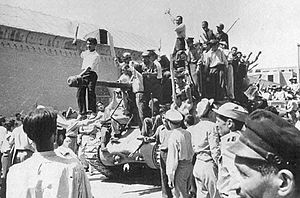Influences From The West
The Middle East throughout history has been a primary place of conflict. Over the years the Middle East have clashed with many Western countries due to invasion, seizing of land, resources, world wars, revolutions and morals. These instances have all shaped history and have continued to have an impact on the relations of the Middle East and Western countries today.
There are many notable circumstances that have happened since the late 11th century. For instance, in the midst of the French Revolution Napoleon Bonaparte commanded a military descent into Egypt in 1798. This act of aggression launched a series of European conquest throughout the Middle East which paved the way for colonization and opposition. Eventually, World War One would have a huge impact on the Middle East when the former Ottoman Empire became allies with the Central Powers in 1914.
 |
| Leaders of the Central Powers |
In the hopes to instigate revolts in the Arabian Peninsula and to occupy Iraq, Syria and Palestine, by 1918 British and French troops occupied the former Ottoman capital of Constantinople when hostilities ended between the Ottoman Empire and the Allies of World War One following the Armistice of Mudros. The aftermath of World War One was preceded with the Sykes-Picot agreement, a secretive agreement which was made before the end of the war on May 19, 1916. This agreement concluded that most of the Arabian land ruled under the Ottoman Empire would be divided between the British and French when World War One ended. Through this scheme the Syrian coast and a good portion of modern day Lebanon went to France, while Britain on the other hand took control of central and southern Mesopotamia which is situated between the Baghdad and Basra provinces. Britain and France would also obtain free passage and trade in the other territories of significance such as, Syria, Mosul and Jordan. Evidently, after the war many Arabian resistance movements surfaced to challenge European control.
 |
| Louis Franchet d'Espèrey marching in Beyoğlu, February 8, 1919 |
Following the end of World War Two the world saw the United Sates rise to power with three main concerns; oil, support and protection of the new nation Israel, and containment of the Soviet Union. In the years to come the United States would have a huge impact on the Middle East. A well known incident that occurred was when the United States and British backing led to the overthrow of Iranian Prime Minister Mohammad Mosaddegh in 1953. Following the overthrow of Prime Minister Mohammad Mosaddegh a new government was formed which allowed Mohammad-Reza Shah Pahlavi to rule the country more firmly as a monarch. This new formed rule relied largely on the United States and British support until his overthrow in February 1979.
 |
| Tehran men celebrating the coup |
 |
| Iranian students crowd the U.S. Embassy in Tehran(November 4, 1979) |
In conclusion it is pretty apparent that the Middle East and West have had many unfortunate events that have impacted their relations. In the near future there may be hopes for better relationships to form over common goals. If circumstances were to be adressed and agreed upon by the Middle East and Western countries, instead of solo decisions, then hopefully there would be improvements.
Works Cited
"The Middle East and the West: A Troubled History". National Public Radio. National Public Radio, Febuary 26, 1970. Web. 2016. http://www.npr.org/news/specials/mideast/the_west/
"History of the Ottomam Empire during World War I". Wikipedia. Wikipedia, 2001. Web. January 19, 2016 https://en.wikipedia.org/wiki/History_of_the_Ottoman_Empire_during_World_War_I
"US-Iran relations: A brief guide". BBC. Web. November 24, 2014. http://www.bbc.com/news/world-middle-east-24316661
"Iran country profile". BBC. Web. January 20, 2016. http://www.bbc.com/news/world-middle-east-14541327
"War on ISIS: Who's doing what?". CNN. Web. November 27,
2015. http://www.cnn.com/2015/11/20/world/war-on-isis-whos-doing-what/
"Middle East". Wikipedia. 2001. Web. January 15,2016. https://en.wikipedia.org/wiki/Middle_East#History
"Armistice of Mudros". Wikipedia. 2001. Web. January 3, 2016.https://en.wikipedia.org/wiki/Armistice_of_Mudros
"Evening pass over the Sahara Desert and the Middle East". Youtube. May 2005. Youtube. October 24, 2011. https://www.youtube.com/watch?v=zvqH8K7x2dM
"Iraq Explained-ISIS, Syria and War". Youtube. May 2005. Youtube. June 19, 2014.
https://www.youtube.com/watch?v=AQPlREDW-Ro
"Iraq Explained-ISIS, Syria and War". Youtube. May 2005. Youtube. June 19, 2014.
https://www.youtube.com/watch?v=AQPlREDW-Ro

No comments:
Post a Comment